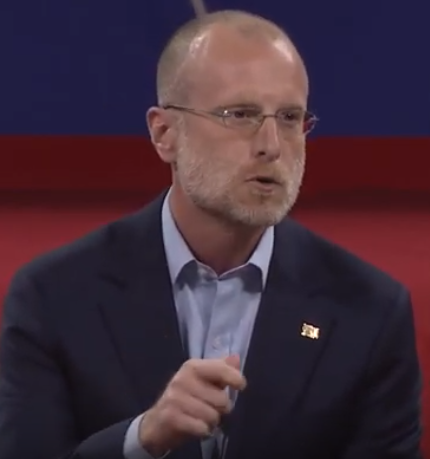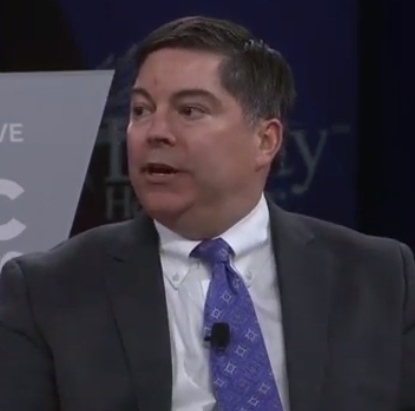Carr, O'Rielly Raise Big Tech Red Flags at CPAC
The smarter way to stay on top of the multichannel video marketplace. Sign up below.
You are now subscribed
Your newsletter sign-up was successful
Republican FCC commissioners Brendan Carr and Michael O'Rielly echoed shared about Big Tech and Silicon Valley at the America Conservative Union's Conservative Political Action Conference (CPAC) conference outside Washington Saturday (Feb. 29).

Addressing allegations of conservative bias on online platforms, Carr said he did not think the answer was "to do nothing." He cited what he said was a leaked document from Twitter "that it would soon be able to allow political ideologues to stamp tweets as misinformation based on their perspective," saying: "I don't think that's the right thing."
"If you don't want MSNBC fact-checking the information you see on Twitter," he said, "I think you should be empowered to make that decision and turn those types of bias filters off. That comment drew applause from moderator Gordon Chang and the audience.
Asked to weigh in on the charge that Google is helping China spy on its own people, Carr conceded there was little the FCC could do from a jurisdiction standpoint, but he weighed in regardless. "I'll say this. The hypocrisy here is stunning. Those in Silicon Valley have no problem telling the rest of the country what we should think; what we should believe; what our values are. The second it comes to getting into a country with nearly two billion people, all of a sudden those values they preach to us kind of go by the wayside."
Carr is hardly alone in that assessment. Silicon Valley has drawn criticism from both sides of the political spectrum.
But Carr conceded it was a tough decision for a company like Google to make, whether to bring those countries a taste of freedom, or stay out.

O'Rielly said he was sympathetic to the arguments that have been made "in terms of the harms high-tech companies present in terms of their censoring of American conservatives, the work they are trying to do internationally in the most harmful countries in the world and how that has built up those networks to cause harm to people throughout the world. So we are mindful of that. We use our voice to help amplify the need to address those matters but there is only so much we can do directly.
The smarter way to stay on top of the multichannel video marketplace. Sign up below.
On the issue 5G supremacy, Carr gave President Trump credit for "flipping the script" when, under the previous Democratic Administration, Carr said the U.S. was under serious risk of ceding leadership in 5G to China and others.
Carr said the new script is that the FCC has the strongest 5G network.
Chang, author of "The Coming Collapse of China," came out firing at Chinese telecom Huawei, which he said is wiring up most of the world. He even led the audience in a brief chant: "Stop Huawei, Stop China," a chant that Carr and O'Rielly did not join, but stood and applauded as the session ended.
The FCC recently excluded Huawei tech from broadband subsidy money and the Trump Administration has signaled it is an untrustworthy supplier and national security threat, though it also sent the signal that that status could be a chip in trade talks.
Carr suggested the President had sent a "clear message" that "we are going to do whatever it takes to secure our nation's networks from that threat."
Carr said that the FCC was doing its part by prohibiting subsidized Huawei gear from U.S. networks and looking to rip and replace it in existing networks. He also cited cracking down on IP theft, including by Huawei, in trade talks, again giving the President credit.
Carr said the U.S. Can't treat Huawei as "anything other than a threat to our collective security." He said that China and Huawei, which "does their bidding," has a list of malign conduct--bribery, corruption--"longer than a CVS receipt,"
Chang asked how moving to virtualized networks--software rather than hardware-centric--could help secure U.S. networks and decrease reliance on foreign companies like Huawei, Nokia and Ericksson--the Big Three in 5G tech.
O'Rielly said moving to cloud-based networks would be a U.S. sweetspot. "In a virtualized world we are talking about moving most of the software to the cloud where the U.S. companies are dominating and will continue to dominate for decades to come."
He said that will allow the country to move away from the end-to-end architecture Huawei has been pushing. O'Rielly said that move was not something the government was not having to force on companies because they were moving to virtualized networks on their own. "It is in their best interests to gain the efficiencies of the cloud. So it is not about forcing anyone, he said, but instead about market forces meeting the demand for networks that are better protected from the "harmful things" the Chinese network is trying to do.
Carr seconded that, agreeing that it was a triumph of the free market.
Contributing editor John Eggerton has been an editor and/or writer on media regulation, legislation and policy for over four decades, including covering the FCC, FTC, Congress, the major media trade associations, and the federal courts. In addition to Multichannel News and Broadcasting + Cable, his work has appeared in Radio World, TV Technology, TV Fax, This Week in Consumer Electronics, Variety and the Encyclopedia Britannica.

